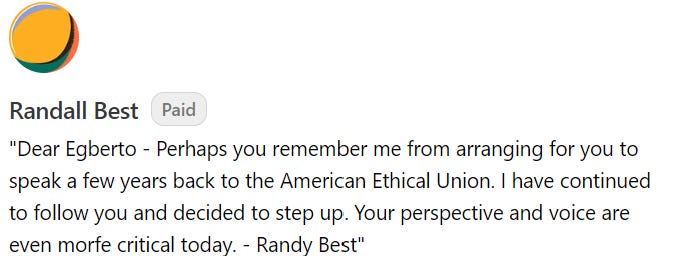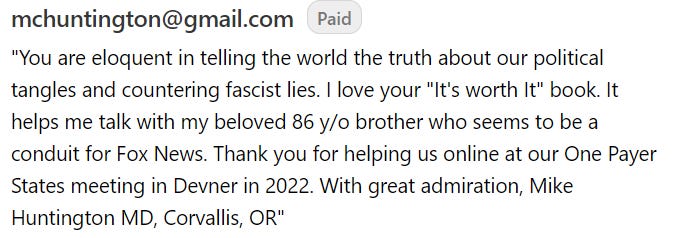Capitalism does not need Democracy. China is the model & Project 2025’s Goal.
We were indoctrinated to believe that capitalism is dependent on Democracy. China proves that the most efficient capitalism occurs in autocracies, and Project 2025 has that as its goal.
THANK YOU IN ADVANCE FOR YOUR SUPPORT! We are feverishly working triple time to ensure we win this existential election.
We are grateful for our Paid Subscribers and Free Subscribers. In this political climate, we need several hundred more Paid Subscribers. Misinformation funded by the deep pockets of our Oligarchy floods the internet. We are using all our platforms on-air, online, and in publications to counter that. We ask that you invest the equivalent of less than a coffee to ensure we can keep doing this effectively. Please invest in a Democracy that serves all of us by becoming a paid subscriber. It comes with many benefits.
Multiracial organizing to beat the Oligarchy
There exists a fundamental misunderstanding about the relationship between capitalism and democracy. From childhood, most Americans are taught to view these two concepts as inherently intertwined—capitalism being the engine of economic freedom, and democracy the system that preserves political freedom. However, the reality is far more complex. Capitalism does not inherently require democracy to function or thrive. China serves as a stark example of a country where capitalism and autocracy coexist and even flourish in tandem. This model presents a troubling future, one that projects like Project 2025 aim to replicate in the United States.
The central point being raised is that capitalism is not synonymous with freedom. The ideology ingrained in the American psyche conflates the two, but China’s economic success under a communist government starkly challenges that assumption. China’s economy, the 2nd largest capitalist system in the world, is characterized by intense state control and a lack of individual rights. Ironically, many American corporations rely on China’s labor force and manufacturing efficiency while decrying the lack of freedom there. The U.S. doesn’t admit that China’s autocratic system allows it to be a more efficient capitalist machine, free from the checks and balances, debates, and regulations that often slow progress in democratic nations.
China’s efficiency in capitalism arises not from a democratic consensus but from an autocratic command. Decisions can be made swiftly, and policies implemented without delay. The autocrat’s word is final, and industries adapt without the roadblocks of public opinion or competing political interests. This is precisely why China has become a global manufacturing powerhouse, producing goods cheaply and efficiently for Western markets. In contrast, in the U.S., changes to economic policies must pass through legislative bodies, subject to debate, delay, and compromise. While this process respects individual freedoms and the rule of law, it also slows the machine of capitalism, making it less “efficient” than China’s autocratic model.
This brings us to the current American political landscape and the threat posed by the ideological goals of Project 2025. Project 2025 is a blueprint for dismantling the remnants of democracy in the U.S., echoing elements of China’s model of authoritarian capitalism. The project, developed by right-wing think tanks and conservative political groups, aims to reshape American governance, concentrating power in the executive branch and weakening the influence of democratic institutions. Their vision isn’t one of outright dictatorship, but it seeks to erode the checks and balances that prevent autocratic rule. Under the guise of efficiency and restoring “American greatness,” the proponents of Project 2025 are preparing the groundwork for a more authoritarian capitalist system—further prioritizing the needs of capital over those of the people.
At its core, Project 2025 is about consolidating power and wealth in the hands of a few, much as the Communist Party of China does. Under the neoliberal agenda, deregulation, privatization, and the rollback of public services are touted as paths to efficiency. However, insightfully, what is labeled as “efficiency” in capitalism is often a euphemism for profit maximization for the elite at the expense of the majority. The American healthcare system serves as a prime example. In imaginary non-math theory, competition between private insurers should lower costs and improve services. It results in fragmented care, rising premiums, and a bloated administrative system. As highlighted, Americans are sold the illusion of choice while navigating an inefficient, expensive system where the real winners are the corporate executives.
The same principle applies to labor relations. America prides itself on being a land of contracts, where individual agreements are respected. However, this respect is selective. Indigenous peoples, for instance, have had countless treaties broken when it suited the needs of the U.S. government or corporate interests. Similarly, contracts between workers and employers are skewed in favor of the latter in the labor market. Patents and intellectual property laws, which claim to incentivize innovation, often serve as tools to extract value from workers and creators, consolidating wealth in the hands of corporations for decades at a time. I cover much of this in two books I wrote, “As I See It: Class Warfare: The Only Resort To Right Wing Doom,” and “How To Make America Utopia: Take The Economy From Those Who Rigged It.”
The push toward autocratic capitalism, whether through the lens of China or Project 2025, reveals an uncomfortable truth: capitalism thrives just as well, if not better, under authoritarian regimes. The idea that democracy is a necessary partner for capitalism is a myth perpetuated to keep citizens complacent. As demonstrated by China’s success and the goals of Project 2025, capitalism is perfectly comfortable operating within systems that curtail personal freedoms so long as profits continue to flow.
Progressives must recognize this dangerous trajectory. As the right wing pushes its agenda forward, cloaked in promises of efficiency and greatness, it is crucial to resist the narrative that capitalism inherently aligns with democracy or that individual freedom is its end goal. The American system is at a crossroads, and the lessons from China are clear: capitalism does not need democracy to thrive, and in fact, it may prefer a system where the voices of dissent are silenced, and the state operates in service to capital, not people.
If America is to avoid the fate of becoming a capitalist autocracy, where profits are prioritized over people and the democratic process is sidelined in favor of efficiency, then it must actively resist projects like Project 2025. The time to wake up is now.
Viewers are encouraged to subscribe and join the conversation for more insightful commentary and to support progressive messages. Together, we can populate the internet with progressive messages that represent the true aspirations of most Americans.
Can we count on your help to reach our goal of 300 needed new paid subscriptions by the end of the month?
The other side has big donors and everyday citizens who invest heavily in platforms that lie and misinform. All we have is you. So, please invest in our media outlet by clicking the subscribe button below to become a paid subscriber. You won’t miss that coffee, but it will make a difference in our politics as we spread the truth about our policies and progressive politics. All paid subscribers get to read my five books on this platform and all subsequent books I write. They will also be privy to subsequent incentives.









Egberto, my hat is off to you. This is one of your best-ever blog posts: intriguing, thought-provoking, myth-busting. “Capitalism thrives just as well, if not better, under authoritarian regimes.” It brings to mind the gripping 1962 drama, The Manchurian Candidate. Spoiler alert: the big reveal is that the film’s supposedly anticommunist super-patriot secretly leads an authoritarian plot to take over America.
Sounds an awful lot like the Heritage Foundation’s Project 2025: ultra far-right, super patriotic, but like the film’s Manchurian candidate, actually hellbent on engineering an authoritarian coup to take over America.
I love the irony: the Heritage Foundation and its many morally filthy minions serving as a collective Manchurian candidate. Though Heritage has now been exposed, it’s still there, still dangerous, and still hellbent on transforming the US into an authoritarian state.
Every person who reads these words can play a part in this drama, literally and figuratively, by VOTING and also by encouraging other folks to turn out and vote.
The Manchurian Candidate was released 24 Oct 1962. This coming 24 Oct will mark the film's 62nd anniversary — less than two weeks before Election Day 2024, which in turn will determine whether the real-life Heritage plot succeeds, or not.
Again, you have a role to play. Take it seriously, and ACT NOW.
…China is not a Communist country. The deception is in having the “Chinese Communist Party” (CCP) as the name of the power structure. China began its transformation from Communism to Fascism when Mao died in 1976. It is now complete, as is Russia’s transformation, beginning with the dissolution of the USSR in 1991.